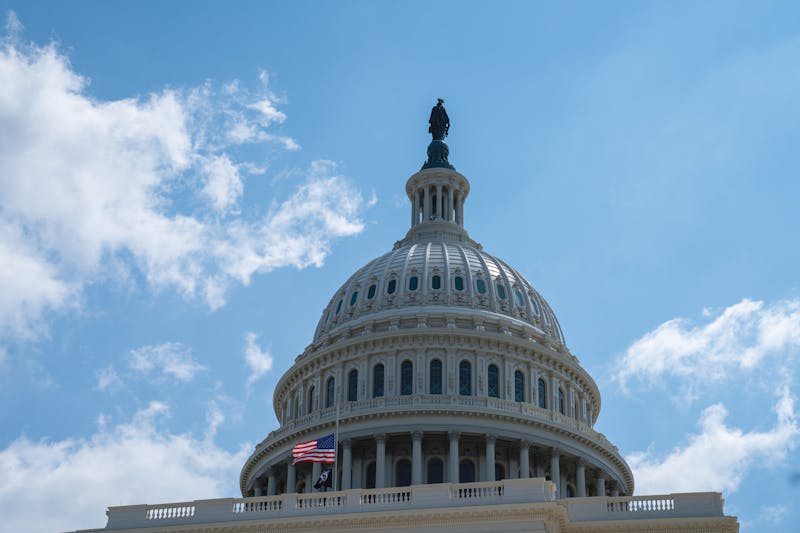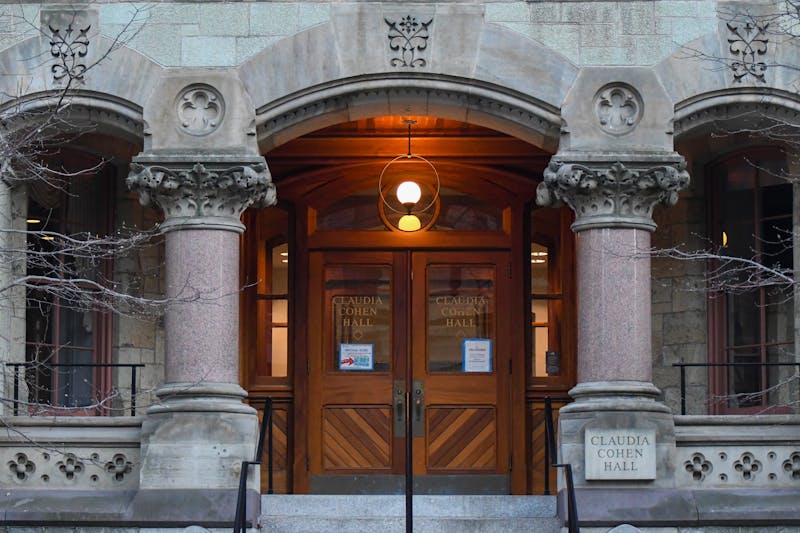
Penn’s Faculty Senate hosted a panel of academic leaders and researchers to discuss the cost and value of higher education on Wednesday.
The Feb. 26 panel — titled “The Price of Knowledge: Is a College Degree Worth the Cost?” — was the second iteration of the Faculty Senate’s three-part colloquium series “The Future of American Universities.” The conversation focused on topics involving the value of higher education and how colleges and universities can better “justify” the worth of a degree, according to the announcement.
The discussion took place at the Annenberg Public Policy Center and was moderated by Management professor and Wharton’s Center for Human Resources Director Peter Cappelli. Panelists included Pew Research Center senior researcher Richard Fry, Macalester College President Emeritus Michael McPherson, and Harvard Graduate School of Education professor Bridget Long.
Following a foreword from Interim Penn President Larry Jameson and Provost John Jackson Jr., Cappelli began by asking Fry to share his economic analysis on the value of a college degree.
Fry answered that there was a disconnect between America’s understanding of a college degree and the empirical economic value of a college education. He noted that, despite public opinion suggesting otherwise, data shows that college graduates financially outperform high-school graduates, even when factoring in student loans.
McPherson added that a college education was especially important given the current job market concerns surrounding artificial intelligence — noting that college graduates were the most well-protected from labor shifts during the early days of the internet.
“Everybody is worried about AI now, but historically, the people who are more likely to be resourceful and effective at responding to change are college graduates,” McPherson said.
The panel also addressed a shift in public opinion regarding the value of college, especially in the context of the highly publicized Congressional testimony from the presidents of Penn and two other universities that would lead to the resignation of then-Penn President Liz Magill.
Long said that an overemphasis in the media over the testimony of a few elite schools contributed to the public's skepticism towards higher education. She argued against the framing of higher education in terms of financial return, stating that the worth of college also includes collaboration skills, critical thinking, and citizenship.
“It’s not about what you’re doing in your job, but how you are an informed community member,” Long said. “We really do need to rethink the paradigm of just [taking] credits.”
Fry added that political perceptions of elite institutions and the content they teach have also impacted public beliefs on higher education.
“[The public] sees what’s being taught on college campuses as not strictly skill building,” Fry said. “They see a lot of politics [in] it.”
Cappelli then asked panelists to reflect on the decline in the humanities — noting that enrollment in the humanities has taken “a beating” in recent years.
Since 2003, Penn has seen a decline in the number of students graduating with degrees in the humanities and the social sciences as well as a simultaneous rise in the number of students graduating with degrees in natural sciences.
Long said she believed that humanities and the liberal arts will become increasingly important in a world dominated by AI.
"[AI] just makes the humanities so much more important," Long said. "The things that computers can't do are the humanities"
McPherson also cautioned against students selecting majors solely based on earnings.
“It reinforces the sense that all college is about is dollars,” McPherson said, while also noting that it was difficult to forecast which careers would be the most well-paying in a decade. “It’s irresponsible and harmful.”
The panel concluded with Cappelli asking the panelists to speculate on the future of higher education.
Long stated that, even prior to policy changes to higher education under the Trump administration, he was concerned about the financial future of higher education. Long added that cuts to higher education may become a “budget balancer” as other policy areas take governmental priority.
“In order for higher education to continue growing it would require government action,” Long said. “I’m not sure that the money would be there, even if we were in a different administration.”
The Daily Pennsylvanian is an independent, student-run newspaper. Please consider making a donation to support the coverage that shapes the University. Your generosity ensures a future of strong journalism at Penn.
Donate











